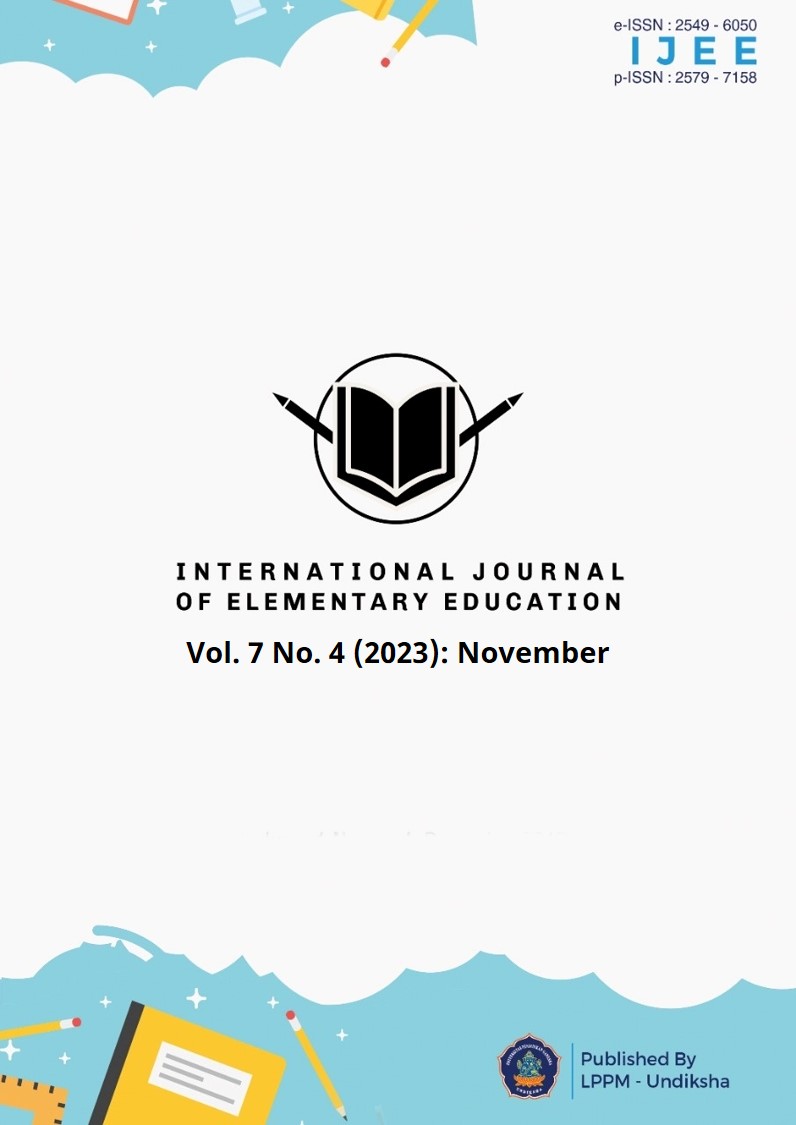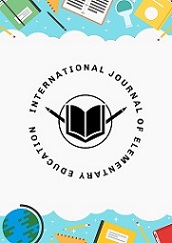Profile of Students’ 21st Century Skills in Digital Learning Using The Contextual Teaching and Learning (CTL) Model
DOI:
https://doi.org/10.23887/ijee.v7i4.66570Keywords:
CTL Model, Digital Learning, The 21st Century SkillsAbstract
The 21st century skills are skills that really need to be developed to face the current digitalization era. Looking at the current conditions, students' 21st century skills are not very prominent and are not well developed so that students need new innovations that can support 4C skills. The purpose of this study was to analyze the 21st century skill profile of first semester Elementary School Teacher Study Program students in the elementary physics basic concepts course. This type of research is descriptive research. The sample of this research was 110 students selected with a specific purpose or by purposive sampling technique. The data collection techniques used are questionnaires, interviews, and observation. The data were analyzed using descriptive statistics which would show the percentage of the number of students per category. The results of this study indicate that for creative thinking skills, collaboration and communication the percentage of students is in the near standard category. As for creative thinking skills, the percentage of students is in the substandard category. This shows that students' 21st century skills still need to be improved. learning activities that facilitate the emergence of 21st century skills need to be carried out continuously or continuously so that students are accustomed to and achieve the desired standards. The conclusion of this study is that students' 21st century skill profiles in digital learning with CTL are in a status close to a good standard, except for creative thinking skills that still require some extra treatment to improve them.
References
Afdareza, M. Y., Yuanita, P., & Maimunah, M. (2020). Development of learning device based on 21st century skill with implementatiton of problem based learning to increase critical thinking skill of student on polyhedron for grade 8th junior high school. Journal of Educational Sciences, 4(2), 273–284. https://doi.org/10.31258/JES.4.2.P.273-284. DOI: https://doi.org/10.31258/jes.4.2.p.273-284
Andriana, E., Fauzany, P. S. D., & Alamsyah, T. P. (2022). 21st Century Multimedia Innovation: Development of E-LKPD Based On Scientific Inquiry in Science Class. Journal of Innovation in Educational and Cultural Research, 3(4), 731–736. https://doi.org/10.46843/jiecr.v3i4.242. DOI: https://doi.org/10.46843/jiecr.v3i4.242
Ariyani, E. D., & Hadiani, D. (2020). Hubungan Pola Keterampilan Komunikasi Interpersonal dan Prestasi Akademik Mahasiswa. JSHP : Jurnal Sosial Humaniora Dan Pendidikan, 4(2), 141–149. https://doi.org/https://doi.org/10.32487/jshp.v4i2.849. DOI: https://doi.org/10.32487/jshp.v4i2.849
Baroya, E. H. (2018). Strategi Pembelajaran Abad 21. As-Salam: Jurnal Ilmiah Ilmu-Ilmu Keislaman, 1(1), 101–115. https://doi.org/http://journal.stai-yamisa.ac.id/index.php/assalam/article/view/28/19.
Basri, H., & As’ ari, A. R. (2019). Investigating Critical Thinking Skill of Junior High School in Solving Mathematical Problem. International Journal of Instruction, 12(3), 745–758. https://eric.ed.gov/?id=EJ1220211. DOI: https://doi.org/10.29333/iji.2019.12345a
Claro, M., Salinas, A., Cabello-Hutt, T., San Martín, E., Preiss, D. D., Valenzuela, S., & Jara, I. (2018). Teaching in a Digital Environment (TIDE): Defining and Measuring Teachers’ Capacity to Develop Students’ Digital Information and Communication Skills. Computers and Education, 121, 162–174. https://doi.org/10.1016/j.compedu.2018.03.001. DOI: https://doi.org/10.1016/j.compedu.2018.03.001
Coffelt, T. A., Grauman, D., & Smith, F. L. M. (2019). Employers’ Perspectives on Workplace Communication Skills: The Meaning of Communication Skills. Business and Professional Communication Quarterly, 82(4), 418–439. https://doi.org/10.1177/2329490619851119. DOI: https://doi.org/10.1177/2329490619851119
Dewi, A. P., Putri, A., Anfira, D. K., & Prayitno, B. A. (2020). Profil Keterampilan Kolaborasi Mahasiswa pada Rumpun Pendidikan MIPA. Pendagogia Jurnal Ilmu Pendidikan, 18(01), 57–72. https://doi.org/https://doi.org/10.17509/pdgia.v18i1.22502.
Dewi, K. P., Ismaniati, C., & Murti, R. C. (2023). One-Gate Digital Archive for Elementary School Digitalization. Journal of Innovation in Educational and Cultural Research, 4(1), 81–88. https://doi.org/10.46843/jiecr.v4i1.425. DOI: https://doi.org/10.46843/jiecr.v4i1.425
Fajri, I., Yusuf, R., Zailani, M., & Yusoff, M. (2021). Model Pembelajaran Project Citizen Sebagai Inovasi Pembelajaran Dalam Meningkatkan Keterampilan Abad 21. Jurnal Hurriah: Jurnal Evaluasi Pendidikan Dan Penelitian, 2(3), 105–118. https://doi.org/10.56806/jh.v2i3.30. DOI: https://doi.org/10.56806/jh.v2i3.30
Gainau, M. B. (2021). Pengantar Metode Penelitian. PT Kanisius.
Gjelaj, M., Buza, K., Shatri, K., & Zabeli, N. (2020). Digital Technologies in Early Childhood: Attitudes and Practices of Parents and Teachers in Kosovo. International Journal of Instruction, 13(1), 165–184. https://doi.org/https://doi.org/10.29333/iji.2020.13111a. DOI: https://doi.org/10.29333/iji.2020.13111a
Henriksen, D., Henderson, M., Creely, E., Ceretkova, S., Černochová, M., Sendova, E., Sointu, E. T., & Tienken, C. H. (2018). Creativity and Technology in Education: An International Perspective. Technology, Knowledge and Learning, 23(3), 409–424. https://doi.org/10.1007/s10758-018-9380-1. DOI: https://doi.org/10.1007/s10758-018-9380-1
Husain, R., & Kaharu, A. (2020). Menghadapi Era Abad 21: Tantangan Guru Pendidikan upaten Bone Bolango. Jurnal Obsesi : Jurnal Pendidikan Anak Usia Dini, 5(1), 85. https://doi.org/10.31004/obsesi.v5i1.527. DOI: https://doi.org/10.31004/obsesi.v5i1.527
Indarta, Y., Jalinus, N., Abdullah, R., & Samala, A. D. (2021). 21st Century Skills : TVET dan Tantangan Abad 21. Edukatif : Jurnal Ilmu Pendidikan, 3(6), 4340–4348. https://doi.org/10.31004/edukatif.v3i6.1458. DOI: https://doi.org/10.31004/edukatif.v3i6.1458
Jufriadi, A., Huda, C., Aji, S. D., Pratiwi, H. Y., & Ayu, H. D. (2022). Analisis Keterampilan Abad 21 Melalui Implementasi Kurikulum Merdeka Belajar Kampus Merdeka. Jurnal Pendidikan Dan Kebudayaan, 7(1), 39–53. https://doi.org/10.24832/jpnk.v7i1.2482. DOI: https://doi.org/10.24832/jpnk.v7i1.2482
Karmila, W., Achmad, S., & Utami, U. (2023). High-Order Questions Improve Students ’ Critical Thinking Skills In Elementary Schools. International Journal of Elementary Education, 7(2), 196–203. https://doi.org/https://doi.org/10.23887/ijee.v7i2.61607.
Kesici, A. (2022). The Effect of Digital Literacy on Creative Thinking Disposition: The Mediating Role of Lifelong Learning Disposition. Journal of Learning and Teaching in Digital Age, 7(2), 260–273. https://doi.org/10.53850/joltida.1063509. DOI: https://doi.org/10.53850/joltida.1063509
Liu, Z. J., Tretyakova, N., Fedorov, V., & Kharakhordina, M. (2020). Digital Literacy and Digital Didactics As The Basis for New Learning Models Development. International Journal of Emerging Technologies in Learning, 15(14), 4–18. https://doi.org/10.3991/ijet.v15i14.14669. DOI: https://doi.org/10.3991/ijet.v15i14.14669
Makiyah, Y. S., Mahmudah, I. R., Sulistyaningsih, D., & Susanti, E. (2021). Hubungan Keterampilan Komunikasi Abad 21 dan Keterampilan Pemecahan Masalah Mahasiswa Pendidikan Fisika. Journal of Teaching and Learning Physics, 6(1), 1–10. https://doi.org/10.15575/jotalp.v6i1.9412. DOI: https://doi.org/10.15575/jotalp.v6i1.9412
Marfiana, R., & Ramadan, Z. H. (2021). ICT-Based Learning Media in the Form of Powerpoint for Grade IV Elementary School Students. International Journal of Elementary Education, 5(2), 350. https://doi.org/10.23887/ijee.v5i3.35494. DOI: https://doi.org/10.23887/ijee.v5i3.35494
Marnita, M., Nurdin, D., & Prihatin, E. (2023). The Effectiveness of Elementary Teacher Digital Literacy Competence on Teacher Learning Management. Journal of Innovation Ini Educational and Cultural Research, 4(1), 45–43. https://doi.org/10.46843/jiecr.v4i1.444. DOI: https://doi.org/10.46843/jiecr.v4i1.444
Monika, T. S., Julia, J., & Nugraha, D. (2022). Peran dan Problematika Guru Mengembangkan 4C Abad 21 di Sekolah Dasar. Jurnal Cakrawala Pendas, 8(3), 884–897. https://doi.org/http://dx.doi.org/10.31949/jcp.v8i2.2672. DOI: https://doi.org/10.31949/jcp.v8i3.2672
Muhali, M. (2019). Pembelajaran Inovatif Abad Ke-21. Jurnal Penelitian Dan Pengkajian Ilmu Pendidikan: E-Saintika, 3(2), 25–50. https://doi.org/10.36312/e-saintika.v3i2.126. DOI: https://doi.org/10.36312/e-saintika.v3i2.126
Prayogi, Rayinda Dwi; Estetika, R. (2019). Kecakapan Abad 21: Kompetensi Digital Pendidik Masa Depan. Jurnal Manajemen Pendidikan: Universitas Muhammadiyah Surakarta, 14(2), 144–151. https://doi.org/10.15330/jpnu.5.1.40-46. DOI: https://doi.org/10.23917/jmp.v14i2.9486
Qureshi, M. I., Khan, N., Raza, H., Imran, A., & Ismail, F. (2021). Digital Technologies in Education 4.0. Does it Enhance The Efectiveness of Learning? International Journal of Interactive Mobile Technologies, 15(4), 31–47. https://doi.org/10.3991/IJIM.V15I04.20291. DOI: https://doi.org/10.3991/ijim.v15i04.20291
Rahayu, R., Iskandar, S., & Abidin, Y. (2022). Inovasi pembelajaran abad 21 dan penerapannya di Indonesia. Jurnal Basicedu, 6(2), 2099–2104. https://doi.org/10.31004/basicedu.v6i2.2082. DOI: https://doi.org/10.31004/basicedu.v6i2.2082
Redhana, I. W. (2019). Mengembangkan Keterampilan Abad Ke-21 Dalam Pembelajaran Kimia. Jurnal Inovasi Pendidikan Kimia, 13(1). https://journal.unnes.ac.id/nju/index.php/JIPK/article/view/17824.
Restu, H.R. Marwan Indra Saputra, Aris Triyono, S. (2021). Metode Penelitian. Budi Utama.
Riyanto, Amin, M., Suwono, H., & Lestari, U. (2020). The new face of digital books in genetic learning: A preliminary development study for students’ critical thinking. International Journal of Emerging Technologies in Learning, 15(10), 175–190. https://doi.org/10.3991/ijet.v15i10.14321. DOI: https://doi.org/10.3991/ijet.v15i10.14321
Sailer, M., Murböck, J., & Fischer, F. (2021). Digital Learning in Schools: What Does it Take Beyond Digital Technology? Teaching and Teacher Education, 103. https://doi.org/10.1016/j.tate.2021.103346. DOI: https://doi.org/10.1016/j.tate.2021.103346
Septikasari, R., & Frasandy, R. N. (2018). Keterampilan 4C Abad 21 Dalam Pembelajaran Pendidikan Dasar. Jurnal Tarbiyah Al-Awlad, 8(2), 112–122. https://doi.org/10.15548/alawlad.v8i2.1597.
Sole, F. B., & Anggraeni, D. M. (2018). Inovasi Pembelajaran Elektronik dan Tantangan Guru Abad 21. Jurnal Penelitian Dan Pengkajian Ilmu Pendidikan: E-Saintika, 2(1), 10. https://doi.org/10.36312/e-saintika.v2i1.79. DOI: https://doi.org/10.36312/e-saintika.v2i1.79
Sousa, M. J., Marôco, A. L., Gonçalves, S. P., & Machado, A. de B. (2022). Digital Learning Is an Educational Format towards Sustainable Education. Sustainability (Switzerland), 14(3), 1–16. https://doi.org/10.3390/su14031140. DOI: https://doi.org/10.3390/su14031140
Sulasmi, E. (2022). Primary School Teachers’ Digital Literacy: An Analysis On Teachers’ Skills In Using Technological Devices. Journal of Innovation in Educational and Cultural Research, 3(2), 140–145. https://doi.org/10.46843/jiecr.v3i2.81. DOI: https://doi.org/10.46843/jiecr.v3i2.81
Sulistiani, I. R. (2020). Contextual Teaching and Learning ( Ctl) Dan Pengaruhnya Terhadap Hasil Belajar Matematika Mahasiswa. Elementeris. Jurnal Ilmiah Pendidikan Dasar Islam, 2(1), 40. https://doi.org/https://doi.org/10.33474/elementeris.v2i1.6966. DOI: https://doi.org/10.33474/elementeris.v2i1.6966
Suryani, N., Setiawan, A., & Putria, A. (2019). Media pembelajaran inovatif dan pengembangannya. Remaja Rosdakarya.
Taufiqurrahman, M. (2023). Pembelajaran abad-21 berbasis kompetensi 4c di perguruan tinggi. PROGRESSA: Journal of Islamic Religious Instruction, 7(1), 77–89. https://doi.org/10.32616/pgr.v7.1.441.78-90. DOI: https://doi.org/10.32616/pgr.v7.1.441.77-89
Tersiana, A. (2018). Metode Penelitian. CV Budi Utama.
Thaha Abdullateef, S. (2021). Remote Learning: Fostering Learning of 21st Century Skills through Digital Learning Tools. Arab World English Journal, 7(1), 190–201. https://doi.org/10.24093/awej/call7.14. DOI: https://doi.org/10.24093/awej/call7.14
Tohani, E., & Aulia, I. (2022). Effects of 21st Century Learning on The Development of Critical Thinking, Creativity, Communication, and Collaboration Skills. Journal of Nonformal Education, 8(1), 46–53. https://doi.org/https://doi.org/10.15294/jne.v8i1.33334.
Tohara, A. J. T. (2021). Exploring Digital Literacy Strategies for Students with Special Educational Needs in the Digital Age. Turkish Journal of Computer and Mathematics Education (TURCOMAT, 12(9), 3345–3358. https://doi.org/10.17762/turcomat.v12i9.5741. DOI: https://doi.org/10.17762/turcomat.v12i9.5741
Trilling, B., & Fadel, C. (2009). 21st century skills: Learning for life in our times. John Wiley & Sons.
Tvenge, N., & Martinsen, K. (2018). Integration of Digital Learning in Industry 4.0. Procedia Manufacturing, 23(2017), 261–266. https://doi.org/10.1016/j.promfg.2018.04.027. DOI: https://doi.org/10.1016/j.promfg.2018.04.027
Wang, A., & Burdina, G. (2023). Developing Students’ Creative Thinking Using Innovative Education Technologies. Interactive Learning Environments, 4(11). https://doi.org/https://doi.org/10.1080/10494820.2023.2184390. DOI: https://doi.org/10.1080/10494820.2023.2184390
Welerubun, R. C., Wambrauw, H. L., Jeni, J., Wolo, D., & Damopolii, I. (2022). Contextual Teaching and Learning in Learning Environmental Pollution: the Effect on Student Learning Outcomes. Prima Magistra: Jurnal Ilmiah Kependidikan, 3(1), 106–115. https://doi.org/10.37478/jpm.v3i1.1487. DOI: https://doi.org/10.37478/jpm.v3i1.1487
Yani, M., Safrida, S., & Muhibuddin, M. (2021). Application of Contextual Teaching and Learning (CTL) Learning Strategies on Metacognitive Ability and Leaarning Outcomes in Immune System Materials. Jurnal Penelitian Pendidikan IPA, 7(4), 576–581. https://doi.org/10.29303/jppipa.v7i4.765. DOI: https://doi.org/10.29303/jppipa.v7i4.765
Downloads
Published
How to Cite
Issue
Section
License
Copyright (c) 2023 Atika Ulya Akmal

This work is licensed under a Creative Commons Attribution-ShareAlike 4.0 International License.
Authors who publish with the International Journal of Elementary Education agree to the following terms:
- Authors retain copyright and grant the journal the right of first publication with the work simultaneously licensed under a Creative Commons Attribution License (CC BY-SA 4.0) that allows others to share the work with an acknowledgment of the work's authorship and initial publication in this journal.
- Authors are able to enter into separate, additional contractual arrangements for the non-exclusive distribution of the journal's published version of the work (e.g., post it to an institutional repository or publish it in a book), with an acknowledgment of its initial publication in this journal.
- Authors are permitted and encouraged to post their work online (e.g., in institutional repositories or on their website) prior to and during the submission process, as it can lead to productive exchanges, as well as earlier and greater citation of published work. (See The Effect of Open Access)










